It’s possible to make steady, harmonious progress in many projects and areas of interests. These simple gentle productivity tools have helped me do it with ease and flow. Since they’ve helped me eliminate overwhelm in my work and creativity as a multi-passionate, I wanted to share them with you on episode 97 of my podcast.
Listen on the embedded player below, or on your preferred podcast player. If reading is your jam, then scroll down for the transcript. Enjoy! 🙂
“You can grow in multiple areas of interests, skills, talents, passions, in a very gentle, harmonious way, and make progress with ease and with flow. So, just because you have multiple passions and talents, doesn’t mean you can’t be productive and organised in a deeply fulfilling way.”
Susmitha Veganosaurus – The Feel Good Factor Podcast
If this is your first time here, I invite you to find out more about The Feel Good Factor Podcast. If you think this content can help someone, do share the episode with them. I’d also greatly appreciate a rating/review wherever you listen to podcasts. They help the show get discovered by more people who resonate with this kind of message.
Transcript of: Five gentle productivity tools for multi-passionate people
(gently edited for a better reading experience)
Hey there, thanks for joining. If this is your first time here, you’re listening to The Feel Good Factor, a podcast about making joy, fun, and deep fulfilment, your highest priority through every aspect of life. Whether it’s work, home life, creativity, business… prioritising feeling good through all of it.
Now if you’ve been listening to the past few episodes of the podcast, you know that I’ve been talking about being multi-passionate quite a bit.
What does it mean to be a multi-passionate?
It’s a person who has various interests, talents, skills, and wants to pursue all of them. Progress, grow and develop all of it. A multi-passionate person is never satisfied doing just one thing, you know, taking one path in life. We like to have our hands in various projects, various activities at any given point of time in our lives.
Now it might seem like this is an unfocused way to live, and you can’t achieve much, or you can’t progress while you’re doing this. Or it could seem like this could be an overwhelming thing to do. For example…
On any typical week in the recent times, these are the various things I’ve been up to
I take a weekly spirituality related course. And then I do one other online course. Plus, I get a lot of reading done. I’m learning Hawaiian on Duolingo. These are my interests that I’m just taking inwards.
When it comes to being productive, I create one podcast episode a week. I do all the editing, publishing, and even the blog post, and the transcript myself. I also have coaching sessions that I conduct for people running conscious businesses – I’m a holistic vegan business coach.
Plus, of course, there’s all the housework you know – cleaning, cooking, doing things around the house in general.
And then to relax, I spend time doing some drawing, which I’m not very good at, but I do like doing it. Some Zentangle, meditative art, doodling, that kind of stuff. I just do that to relax myself.
Of course, like most people these days, I binge watch a bunch of shows on Netflix. I like listening to classical music. And I do chanting, mantras and meditation practices every day.
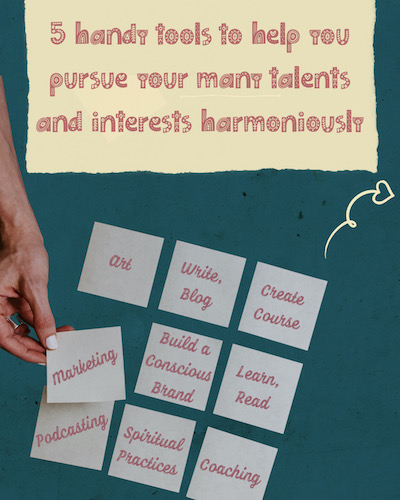
I know this sounds like a lot
The reason I’m sharing this with you is to show that it’s possible to live a very fulfilling, well rounded life. And doing all this can be peaceful, as well as harmonious, and productive.
You can grow in multiple areas of interests, skills, talents, passions, in a very gentle, harmonious way, and just make progress with ease and with flow. So, just because you have multiple passions and talents, doesn’t mean you can’t be productive and organised in a deeply fulfilling way.
So today I wanted to share five tools that have been extremely helpful for me over the past year
I’ve been leaning on these tools, using them to help me organise, and maintain my sanity, while I pursue all these interests. They give me a kind of direction, and help me be more disciplined so that I’m not just fluttering from one activity into another while having very short attention spans.
Instead, I’m able to focus on each activity that I do with a lot of interest, with a lot of discipline, And then I gently move on to other activities, and so on and so forth in a very harmonious and well rounded way.
So these are the tools and they’ve been very useful. I know some of these will seem extremely obvious and simple, but don’t brush them aside because of that, try them anyway. It’s precisely in their simplicity that the power lies. So here we go.
1. Calendar – making use of the Calendar app on your phone or on your computer
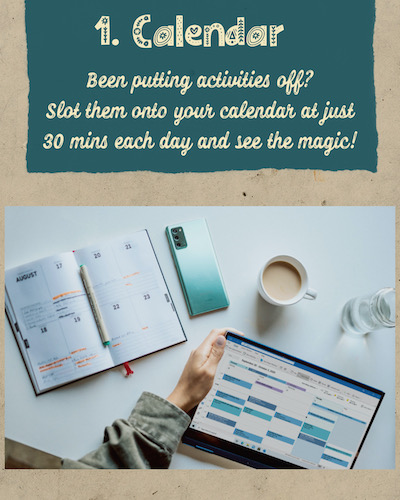
Now you can use a physical paper calendar too, but one advantage of using a digital calendar is so that you can set it off to ping. Whenever something important is coming up you hear a little ping, and you know that “okay this is coming up”, so you don’t have to worry about it.
You can put your activities into the calendar, slot them, and then just forget about them. And the calendar will tell you what to do, when to do. So you’re kind of leaning on outside help instead of you deciding what to do at any moment.
This is especially helpful for activities that you’ve been putting off, things that you think, “I have so much of other work right now, or something occupying my life right now. So I don’t have time for this.”
That is the kind of stuff your calendar is especially useful for because if you want to develop a certain habit like say, reading, or if you want to be involved in a creative project of some kind, and you’ve been putting it off, because you’re occupied with other stuff, even slotting it into your calendar for 30 minutes a day, even half an hour, that makes a world of difference, right?
So you do this five days a week, you already put in two and a half hours involved in reading, creating, or doing that course that you’ve been wanting to do, all of it. So the calendar is a very, very useful tool to take advantage of.
2. Pomodoro Method
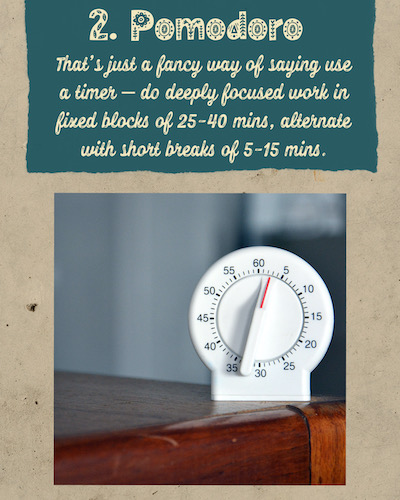
You might have heard of it, but basically Pomodoro is just a fancy way of saying “use a timer”. So you batch your tasks into different blocks of time (25 to 40 mins is what people usually do). And then you turn off all your other devices, notifications, and whatnot.
This is very helpful when you want to be deeply focused and in the flow while doing something, and to do that you turn off everything else. Then you set your Pomodoro app or a timer to go off after those 25-40 mins. And once it pings you take a break.
The break can be anywhere from 5 to 15 mins. You can even alternate the lengths of the break like – you do 25 mins of work, 5 mins of break, 25 mins of work, 5 mins of break, then another 25 mins of work, then 15 mins of break, you know something like that. So you can alternate it that way.
It brings you back memories of school days. You know how we didn’t have to really worry about anything? We had first period this, second period this, then the short break, and third period this… we didn’t have too many things to think about. We just just quietly followed the timetable that was set for us, attended our classes. That releases a lot of burden from your mind.
Also knowing that you need to focus on a certain task only for this limited period of time is going to be helpful for you to get started on any task at all. Especially things that you’ve been putting off, which you feel like they may not be a lot of fun to do.
Just all kinds of filler work that you need to get done out of the way. Thinking, “okay, I’ll just do this for 25 minutes”, and then whatever gets done gets done. So that kind of thing helps when you have difficulty committing.
It also helps when you have very large projects or tasks, and then you feel overwhelmed
So instead if you set it into blocks of time and say, “I’m gonna work on this for 25 minutes. Take a break, and then decide if I’m going to come back to this or not”, and then you give all of your focus, your attention, yourself, you put it into the work, you just do it.
And you’ll be surprised to see how much progress you make in that short span of time. You don’t have to be overwhelmed. If you feel like that was too much for today, you put it off for another day, for another block of time. So the Pomodoro method helps a lot.
The Pomodoro name, it basically means tomato, and that’s because there are these tomato shaped timers. So you just set the timer, and then it clings, and then you set the timer again, and it pings. Of course, there are apps now which can be quite useful.
Find a Pomodoro timer app online, you can see whichever one you get. The one that I use is called Be Focused Pro. You can pre-set blocks of time with brakes and everything so you don’t have to keep setting the timer again and again. It’s all preset.
You can decide, “okay, I’m going to sit down to work for three hours now”. So in those three hours, you can set blocks of time. 25-40 minutes, and then breaks. Alternate work blocks with break blocks.
You chunk your work that way, chunk your time that way, and then three hours are done and you’ve made a lot of progress. It’s quite useful and it sounds simple, but when you try it, you realise that it really helps you be a lot more disciplined and make progress.
3. Mind Map
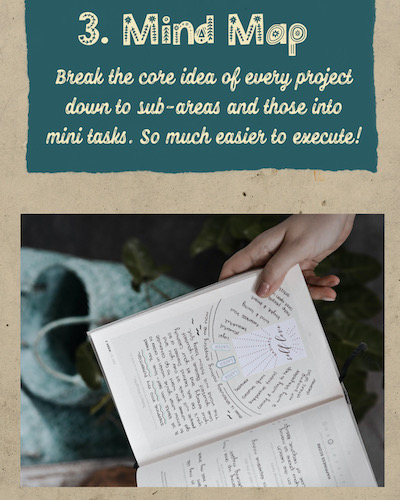
Mind maps are a way to take a big idea, something that might seem quite overwhelming, and then break it down into little bite sized pieces. But in a very organised way so that you have a kind of direction to follow.
You take the core idea of any project and you put that in the middle of a piece of paper. Then you draw a lines out from it, like sun rays. And you write the sub ideas, sub areas of the project all around. Then you draw lines outward from each of those ideas and then write the many tasks involved to get that particular piece of the project done.
This is something that’s used while writing books, or building a course, or anything. Creative or non-creative project the mind map is used. And it’s very useful because you know, sometimes you have so many ideas stuck in our heads. And because we have all of them swirling in there, they are not able to come out. They’re kind of stuck, jammed.
So creating a mind map is a way to shake these ideas out of our heads and onto a piece of paper. That helps you make everything into little bite sized pieces and then you pick up the mini tasks in whatever order you prefer and start working on them in chunks.
That makes any idea, any project so much easier to execute. Which means that you’re going to progress on that project at a much better, steady pace.
4. Kanban Boards
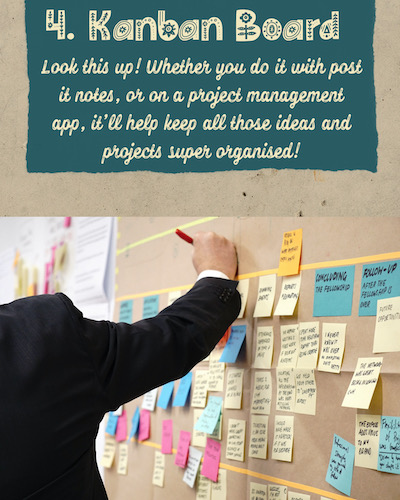
You have these different apps like Asana to help you organise these things, but people even do it with with post it notes. Look this up for more details, but the idea is to manage your project in a very organised way.
So you divide up the different verticals of the project into different columns. Since you are a multi-passionate and you’re working on multiple projects, you divide those into different columns. And then you put the little ideas under each column, the tasks. Then you move things around across you know each project as required if there are some overlaps and things like that.
As you get things done, you pick it off the column. It’s quite simple, but it really helps you keep everything organised. Once you’ve organised everything out like this, when you decide, “today I want to do some work”, but you don’t know which project to work on, what area to focus on, what kind of tasks to get done, you just look at your Kanban Board.
Then you just start picking things, doing them, and getting things out of the way. And you feel so satisfied because your progress is being marked right there. You’re getting things out of the way.
Things from the top of the column just start getting moved to the bottom, whatever’s done. Or you might even want to have a separate column where you can move the done tasks. That way, even at any point in the project, you can track how far you’ve gotten, what you have remaining to do, what you have already done.
This is also very helpful when you’re working with somebody else and you’re both sharing the work on a particular project, without having to follow up with each other. You can track each other’s progress too. So it’s great for teams, but also as a solopreneurs or multi-passionate it’s very, very helpful to keep track of your various projects, and interests, and areas of work.
5. Have Done List
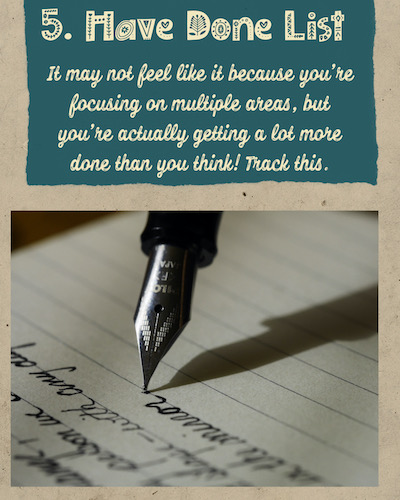
Now we all know about To Do Lists. We have these long lists or in our planners and as we get things done we tick them off and whatnot. But To Do Lists can put a lot of pressure on you.
You feel like there’s so much to do, and no matter how much you do, you feel as if you haven’t got enough done. This is just your mind playing tricks on you because often we’ve progressed a lot more, we’ve accomplished a lot more than we believe.
And because we have so many things, we put this pressure on ourselves, these expectations. We think that enough is not done. So the Have Done List is the exact opposite of a To Do List as the name says.
What you do is, you get one task done, and once it’s done, you put it on your Have Done List. Then you get another task done, and then you put it on your Have Done List. So that way when you feel like you’ve been working for many hours, but you think that you haven’t really progressed, all you have to do is look at your Have Done List.
You feel such a release of burden, so much relief, because you see that you have actually progressed quite a bit
It just doesn’t appear to you that way because you’re looking at all your tasks from up close. But when you go back and look at the big picture, you realise that having done all these tasks, you’re progressing well and quite steadily, so it makes you feel like, “oh wow, I’m doing good.”
Of course that acts as a motivation, because the more you feel you’re progressing, you’ll want to progress some more too. So there’s no space for that critical voice inside your head to say you’re not doing anything, you’re not going forward, you’re not progressing, you’re not focused, you’re not disciplined, blah, blah, blah.
There’s no space only for that voice because you can shove the Have Done List in its face and be like, “listen imaginary person inside my head. Here, look at the Have Done List! Yes, I have done quite a bit.”
So yeah, these are the five different tools that I wanted to recommend to you today
If you want to dive deeper into working with these tools and practically implement them, and of course, many, many, more tools, techniques and practices that will help you lead a harmonious, well rounded, multi-passionate life then join my course.
The cohort based course is starting on Friday, 21st April and ending on May 19th (also a Friday). We’re going to have a one lesson which is less than 10 minutes long every single day. It’s a pre-recorded audio lesson.
You listen to that and it gives you an action step. You take that action step each day. So five days a week this happens. And then over the weekend, you want to catch up, you have some questions, clarify things for yourself, you can do all that, and then on Monday new lessons start.
Also every Monday evening, we have a live video call with the whole group. You can ask me your questions, you can discuss, we can all discuss our progress, share ideas with each other. So it’s kind of like a course and mastermind group.
We’re going to have a support group on the Telegram app. It’s going to be a private group of only the participants where questions can be asked, and interactions can happen between the participants.
It’s a very powerful thing having a mastermind group, and support
I’ve done this, I have been a part of two masterminds in the past few years and they made a world of difference in my life. So I wanted to create this course with a mastermind component so that you have that support system in place. And accountability so that you can keep progressing.
If you’re feeling like you want to gently, peacefully, steadily, harmoniously progress in various areas of life, in various projects, focus on multiple things, and yet keep growing in an organised, systematic way, then this course harmonious mighty passionate life is just for you.
Go to my online academy and sign up, join us. I would love to interact with you on the course!
And of course, I hope all these tools that I shared with you will be very helpful for you
Whether you join the course or not I think these five tools can be quite useful.
- Having a Calendar
- Using the Pomodoro Method
- Creating Mind Maps for all projects
- Maintaining a Kanban Board
- Making the habit of doing a Have Done List every single day
I hope all these five tools are going to be very, very useful to you.
All right, thank you so much for listening. I will talk to you again soon. Take care
Transcribed using Otter
Susmitha Veganosaurus

“I read voraciously, find humour in most things, and I’m most in my element when I’m teaching, writing, and playing with clay. I believe authenticity and kindness are the keys to world peace. Sign up for myfree newsletterwhere I share conversational emails with stories about Life and Business Tips, Vegan Hacks, Holistic Guidance, and more.“